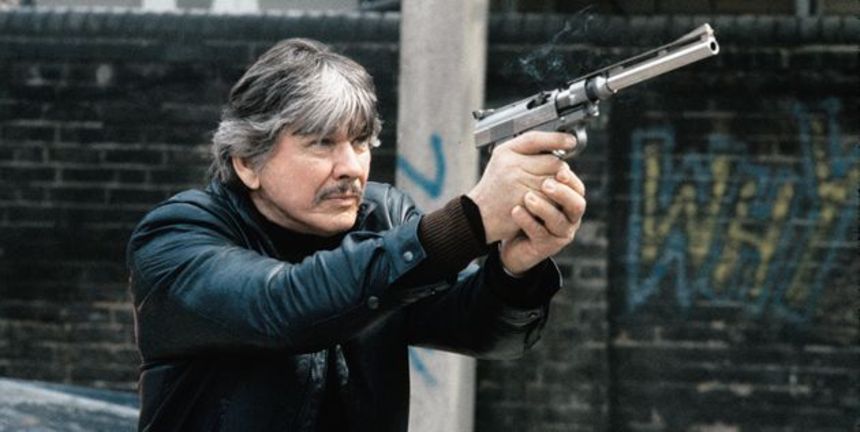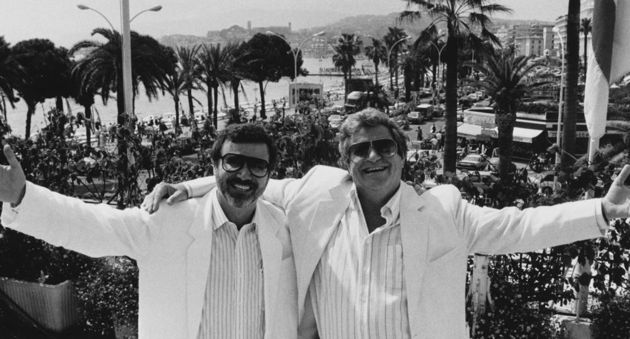Toronto 2014 Review: ELECTRIC BOOGALOO: THE WILD, UNTOLD STORY OF CANNON FILMS Is Lovingly Reverent Of The Ridiculous

Mark Hartley's unofficial biography of Cannon Films impresarios Menahem Golan and Yoram Globus is equal parts reverent and dumbfounded in its depiction of these maverick Hollywood outsiders. Bottling the same level of ravenous reportage for Cannon's bountiful output as Hartley pumped into his Ozploitation expose Not Quite Hollywood, he again creates a roller coaster ride that is as crude, cocky and shamelessly entertaining as the films themselves.
For many people of a certain age and cinematic inclination, Cannon Films holds a strange, almost hallowed place in their hearts, as the prime purveyors of a special kind of late-night schlock entertainment that was dumb, derivative and quintessentially eighties. Propelled by over-the-top action vehicles for such stars of the video age as Chuck Norris, Charles Bronson and Jean Claude Van Damme, Cannon became a hallmark for a very specific kind of silliness. In Hollywood, however, Golan and Globus were a joke outfit, and forever fighting against the current to be taken seriously.
Australian documentarian Mark Hartley was the perfect choice to bring Cannon's story to the screen, after the one-two punch of Not Quite Hollywood and Machete Maidens Unleashed, which ripped the lid of the Ozploitation and Filipino genre filmmaking industries. Hartley's fast-paced MTV-style approach, stitched together through a myriad film clips, interviews and anecdotes from key collaborators, filmmakers and stars perfectly mirrors the Cannon ethos of high-energy, fly-by-the-seat-of-your-pants filmmaking that saw Golan and Globus produce over 200 feature films in a single decade.
Cannon's meteoric rise and calamitous fall was so fast, and incorporated so many disparate threads that it's almost impossible to draw a single narrative through-line. One of Electric Boogaloo's most impressive feats is the dexterity with which it flits back and forth through the 1980s, inter-weaving the different stories into something resembling a coherent whole. In doing so, Hartley consolidates the Cannon story into a number of common themes, or perhaps dreams, which Menahem Golan and his cousin/business partner battled to realise.
Chief among all these was Golan's desperate desire to be taken seriously by Hollywood, and to make popular mainstream American films that would be embraced by American audiences. While his efforts to do so were invariably unsuccessful, and more often than not inadvertently hilarious, the film manages to capture a melancholic air of noble failure about the whole endeavour, as though their promised American Dream somehow upped and fled from them, prohibiting their success in the first place.
During the 1970s, both Golan and Globus were prolific and successful filmmakers in their native Israel, producing dozens of films of all different genres, most notably the coming-of-age teen sex comedy Lemon Popsicle, which the youth embraced wholeheartedly but the older generation found repugnant and deplorable. Written and directed by Boaz Davidson, Lemon Popsicle remains the most successful Israeli film of all time at the local box office, and Golan and Globus brought Davidson with them to America where he helmed their remake The Last American Virgin. That film failed to mirror its predecessor's success, and was a key example of how cultural differences prevented Cannon from truly penetrating the American psyche. Davidson, however, has since gone on to become Head of Development and Creative Affairs at Millennium Films, home of The Expendables and Undisputed franchises, among many other films.

Electric Boogaloo brilliantly highlights the company's tactic of adopting the old studio star relationship, by bringing big name actors into the fold and churning out a multitude of projects for them. In the early days, Cannon worked with bona fide stars like Klaus Kinski and Franco Nero, to wildly fluctuating effect, as well attempting soft porn vehicles for a drug and booze-addled Sylvia Kristel. They created a multitude of roles for a veteran Charles Bronson, who was already well into his 60s when Golan resurrected his seminal role in Death Wish for a string of inferior and increasingly ludicrous sequels with Michael Winner.
Cannon's other big action lead was martial arts star Chuck Norris, for whom they built the Missing in Action franchise, as well as a number of gung-ho, fascistically pro-America titles like Invasion USA and The Delta Force, which Golan himself directed. Many former employees talk about sorting through piles of scripts and - at the behest of their employers - putting all of them into one of two piles: those for Bronson and those for Norris. Unfortunately, Norris has rather publicly distanced himself from his more violent pictures, and so doesn't feature in the documentary. Bronson sadly passed away over a decade ago, so one can only speculate at the incredible anecdotes they could have contributed.
Other notable collaborators who are notable by their absence include Jean Claude Van Damme, who got his big break in Cannon's Bloodsport and also filmed Cyborg the following year, and Sylvester Stallone, who made Cobra for the company and was famously paid an unprecedented fee to appear in Golan's other directorial misfire, the arm-wrestling drama Over The Top. However, the roster of talent that does appear is applaudable, with everyone from Dolph Lundgren (Masters of the Universe) and Michael Dudikoff (American Ninja), to Richard Chamberlain (King's Solomon's Mines) and Lucinda Dickey (Breakin', Ninja III: The Domination) sharing their experiences for Hartley's camera.
Directors including John Frankenheimer, Tobe Hooper and Franco Zefirelli speak fondly of Golan in particular, and praise the producer for always putting his directors first and respecting them in a way they have never experienced elsewhere in Hollywood. It does appear to be the case that Golan, perhaps because he was also a director himself - and certainly considered himself an artist - he was willing to let them create the film they wanted to make. Most likely, however, Golan may have just wanted to be able to say he had worked with the likes of John Cassavetes, Andrei Konchalovsky and Jean-Luc Godard, regardless of the quality of their films.
There are just so many facets to the story of Cannon Films that is impossible to mention everything here. Cannon certainly deserves credit for pioneering the pre-sales model, which has become the norm in the global film marketplace today, while its acquisition of Thorn EMI and treatment of the Pathe Film Library in the United Kingdom was regarded far less favourably. Personally I had many of my formative cinematic experiences of the early 1990s at the Cannon Cinema in Brighton, watching such classics as Unforgiven, Blade Runner: The Director's Cut, Jurassic Park and John Woo's Hard Boiled under that roof.
For all the shit that is inevitably thrown around during Electric Boogaloo, Hartley does a fine job of keeping the tone balanced and the mood light. While some individuals have fonder memories of their time with Cannon than others, they all seem to respect the fact that for Menahem and Yoram it was always about the movies. While there was money, it all went into the productions, and even when they fell into irreparable debt and eventual bankruptcy, their blood, sweat and tears can be seen in their efforts to keep the cameras rolling and get a finished product to the theatres.
Between the film being finished and it arriving on our screens, Menahem Golan sadly passed away, at the age of 85. In a final amusing, quintessentially Cannon moment, a title card at the end of the film informs us that Golan was approached to participate, and upon refusal, promptly put his own official documentary into production. The Go-Go Boys: The Inside Story of Cannon Films beat Electric Boogaloo to the screen by three months, underscoring that even in death, Golan will forever do it cheaper, faster - but not necessarily better - than his competition. And that's the real Cannon story right there.

Do you feel this content is inappropriate or infringes upon your rights? Click here to report it, or see our DMCA policy.






